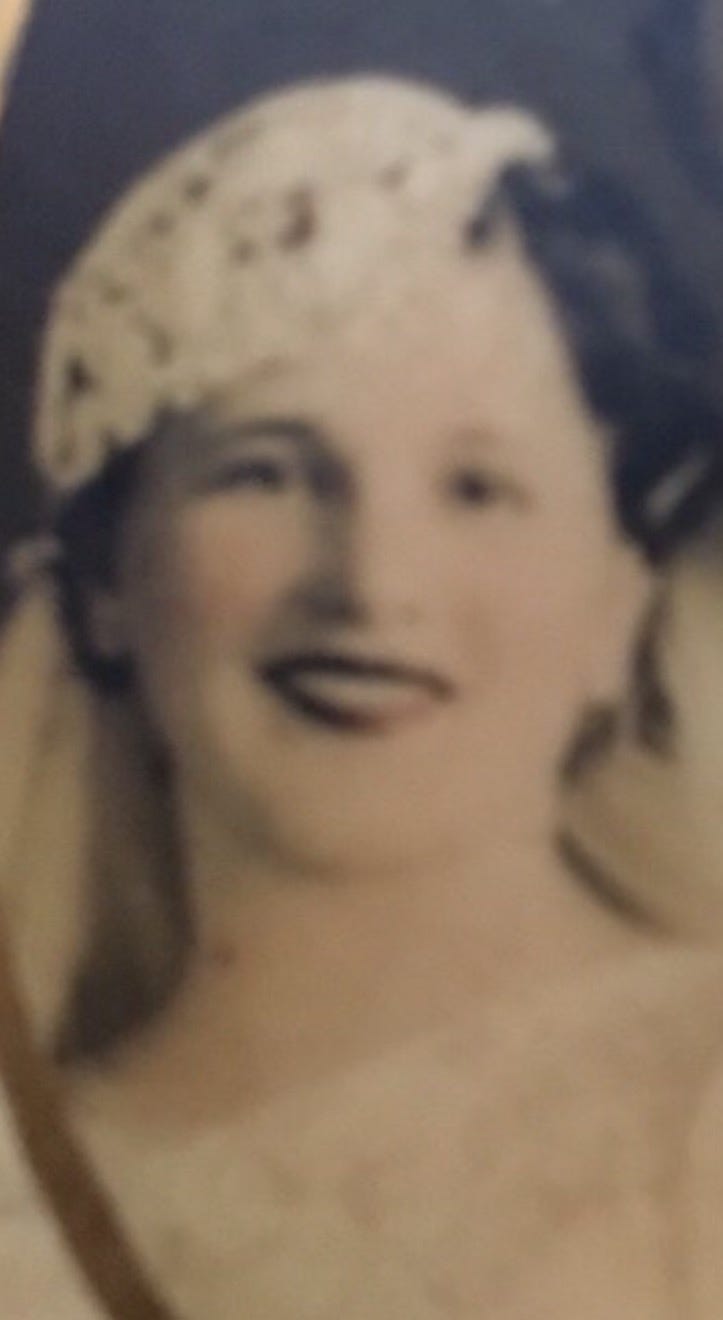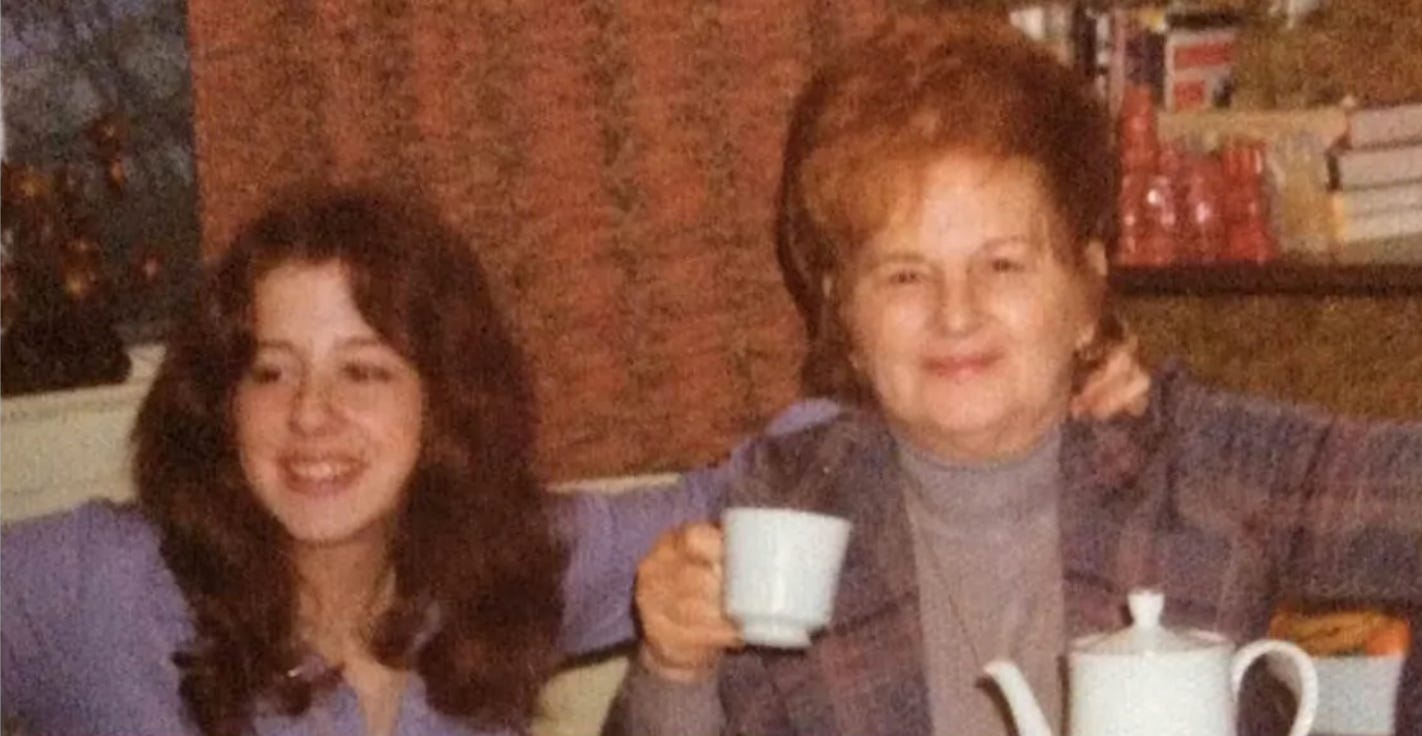About five years ago, this picture popped up on my ancestry.com site. I had never seen it before, and neither had my sisters. “That must be a wedding picture from her first marriage,” one of us speculated. It had to be, as there was no white doily-hat veil, no pictures, no wedding at all when she married my father. Exiled to New Jersey (from Brooklyn), my mother pregnant with my older sister Mickey, they had “broken up” two marriages.
I imagine the unusual circumstances made it extra scandalous, as my mother’s first husband was the brother of my father’s first wife. I say I “imagine” because I didn’t know about my mother’s first marriage until I was eighteen. I grew up knowing my father had been married before—It was impossible to hide it, as there was a son. But they hid whatever they could.
When I found out, I wasn’t scandalized but impressed and amazed. “Running away” together to Newark! My sister Mickey a “love child”! To me, it was romantic; for them, it had been shameful. That they did it despite their shame made it all the more romantic to me. But also surreal. I couldn’t imagine the depressed mother I grew up with being so daring, living a life so full of excitement and sexual pleasure.
I know she was happy once, because my older sister told me so and I caught glimpses myself—as she glammed herself up for the occasional wedding or company events my father was required to attend, or sang Yiddish songs, her body swaying as she puttered around the kitchen, or schmoozed with her younger brothers on the rare occasions when my father (reluctantly) took us all to Brooklyn to visit her relatives, or bested my father at Scrabble (very hard to do), or cheered for a horse she’d bet on at the track. I could see, in those moments, that she was capable of deep enjoyment in life. But by the time I was old enough to go to school, these snapshots of my mother laughing, singing, dancing, teasing, were just that: snapshots.
Born in Poland in 1913, my mother was the daughter of a fearful and superstitious mother and a father who essentially abandoned them. Then she became the wife of (what we used to call) a traveling salesman—my father—who by the time I was born was away much of the time. When my younger sister was born (It was 1951 and I was four) she had a deep dive, which we now would recognize as postpartum depression. In those days, though, no one knew what to make of her fears, her sadness, her various physical symptoms. They gave her Valium and for a time she was in some sort of therapy. But my father was scornful of such “weakness”—there were constant nasty comments about the psychiatrist—and eventually she gave up the therapy, kept up the Valium, and settled into a life of chronic, untreated anxiety.
I know she must have done some things with me that required leaving the apartment without my father or a close friend, but I don’t remember them. She cooked for us, kept the house clean, and was warm and sweet and generous with her hugs, sympathy, and anything else she was able to give. But she never walked me to school or attended any “parental” functions. I don’t remember going clothes shopping with her, or to the movies except when my father, who was a film buff, was home. There were certainly no “life lessons” dispensed—about how to deal with bullies, the “importance of education,” or how to stay strong in the face of disappointment or rejection.
In those days, kids were left more to their own devices. But my mother didn’t accompany us places just because she was unafraid for us, and we knew it. As she sat in my father’s armchair, smoking Kents, watching soap operas, dozing, waiting for him to return from his out-of-town trips, leaving the house only to buy groceries or, now and then, visit a girlfriend, we knew she was barely hanging on to her own feeling of safety in the world.
When my father came home, he brought the world with him. There would be tiny hotel soaps, plastic dolls dressed in buckskin, pecan pralines, restaurant matchbooks to add to my collection. Whisking away for Chinese food, to an air-conditioned movie. The tenuous delight of the huge, good mood that he would be in for at least an evening as he recounted stories of the brokers who would deal only with him, the fabulous hotels and restaurants they ate in as they did their business, assorted oddballs he had run across. The drama was always high, no matter what the story.
To me, with a father who descended only periodically, like Santa, other kids’ fathers seemed almost extensions of the other kids' mothers, vaguely and unheroically domestic. They could stop faucets from dripping (which our father definitely could not), but only our father could do the New York Times Sunday Crossword—in ink—in a morning. I was proud that my father condescended to join the mundane world as a visitor rather than a regular inhabitant. The Midwest brokers, the hotels, the highway that led from Newark to Manhattan, trains and cars that took you from one state to another; it was as though they had a sign on them: "This way lies life."
And the sign on the other door? There were two, actually. One said “Danger!! You don’t want to go here!” The other said “This is where you belong.”
When I was in recovery from my own descent into panic, which kept me housebound for two years in my early twenties, I came to believe that my mother and father represented two distinct sides of my personality: the bold, adventurous me who ultimately would go on to have a very public life as a teacher, writer, speaker, and the fearful me, who, even after recovery, remained unable to fly, drive across bridges or through tunnels, and was sure that every time I went to the doctor, a dread disease would be diagnosed, as if in punishment for learning to leave the house while my mother never did.
But if my mother represented the private, diminished, retreating Susan, why then did I find myself writing a doctoral dissertation which was, at least in part, an ode to the “maternal” world of inter-connections and “empathic” knowledge that the scientific revolution had replaced? And why did I feel that in doing so, I was recovering a part of my mother—and myself—that did not fit neatly into the category of the fearful self?
Writing that dissertation, I remembered that my mother, even when she was most anxious and depressed, would smile at passers by, strike up conversations with people who looked like they needed a sympathetic word, flirt with shopkeepers. She couldn’t accompany me on the 107 bus into New York City, but she wasn’t afraid of strangers. She was also the least judgmental person I knew, quite the opposite of my father, who in his own chronic depression and resentment—he had wanted to be a journalist, but had to quit school during the depression—found flaws in everyone. Had my mother been able to get an education, it’s easy to imagine her becoming a gifted social worker or therapist. She knew how to be warm.
Once in a crowded supermarket, I felt a panic coming on and tried a technique my therapist had taught me. I imagined that everything that was frightening—the noise, the crying children, the pushing and shoving—was a warm, colorful blanket. Mine, I discovered, was all green and gold and burnt sienna, colors that I recognized as those of a throw my mother had knit me, rustic colors that still bring my mother to me unexpectedly as I pass by sunlit trees in autumn. I put that blanket around me with a great effort of imagination, and immediately felt calmed and enveloped rather than invaded by the chattering people in the store.
At the same moment I felt my mother's presence strongly, and I recognized that there was a terrible flaw in my picture of her. Her capacity for human connection, her warmth, was not some compensating factor, developed only to make a small and limited world bearable and less frightening. It was big, it was strong, it was powerful, and it was highly unusual, a remarkable gift. She wasn't afraid of people! She was an adventuress!
I’m looking at two postcards I received from my parents. One, sent to me by my father while I was a freshman living in a dorm in Chicago, was from the "Fabulous White Way" of the "World Famous Las Vegas Strip." Inside, via a foldout display of casinos, hotels, and showgirls, it told the "story" of the Strip. My father had written, beside the photo of the Dunes, that he was staying there, and he sent "greetings from the land of lost wages, daughter!"
Over the years I had received scores of cards like this from him, exuberant with the romance of travel. But the other postcard startled me. It was from my mother, written to me while I was living in Canada, struggling out of my agoraphobia and splitting up with my first husband. It was from Florida, where she had apparently gone—on a plane!— with her best girlfriend at the time. My mother had not been afraid of planes, I now remembered, that was me and my sisters. But a vacation? Without my father? I couldn't remember it, couldn't imagine it, yet the evidence was in my hand.
The cartoon on the front showed a shapely, tanned woman on the beach, beside which my mother had written "Me," and, separated by a line, a little girl bundled up beside a snowman, beside which my mother had written "You." "I'll shovel sand for you in Florida. If you'll shovel snow for me up north," it read, with a space for the temperature, which my mother had filled in at 86 degrees. On the back was her more personal message to me: "Hiya Darling: The flight was smooth as silk. Got a little high and didn't feel anything but happy. Wish you were here. Love from Florence. Say hello to your roommates. Love you, Mom. P.S. Later Dad will come.”






I loved this. Many similarities with my mother: “They hid what they could.” I had three sets of grandparents. I knew that my friends had only two, but when I asked why I was told, “Don’t ask questions.”
Thank you.